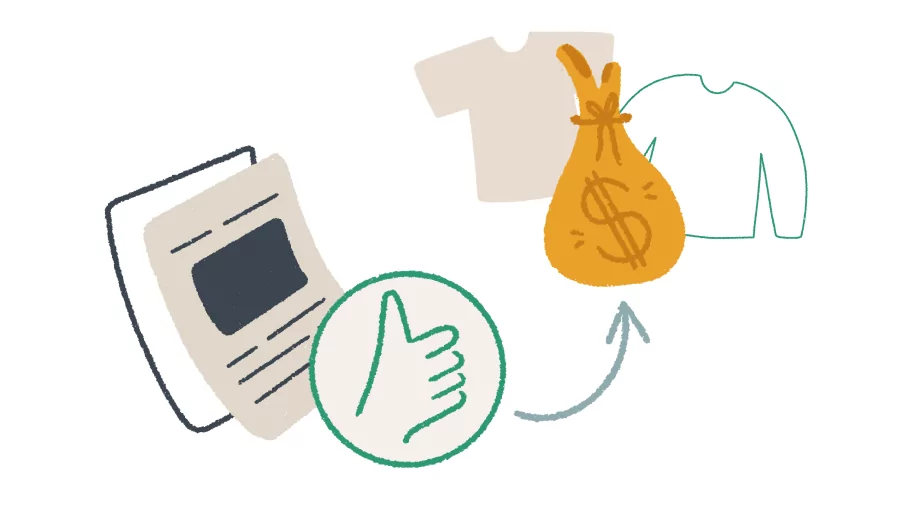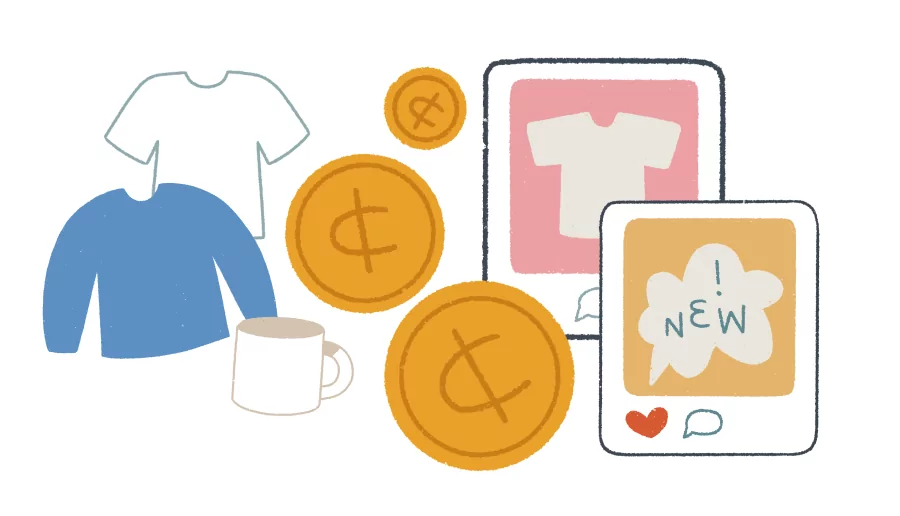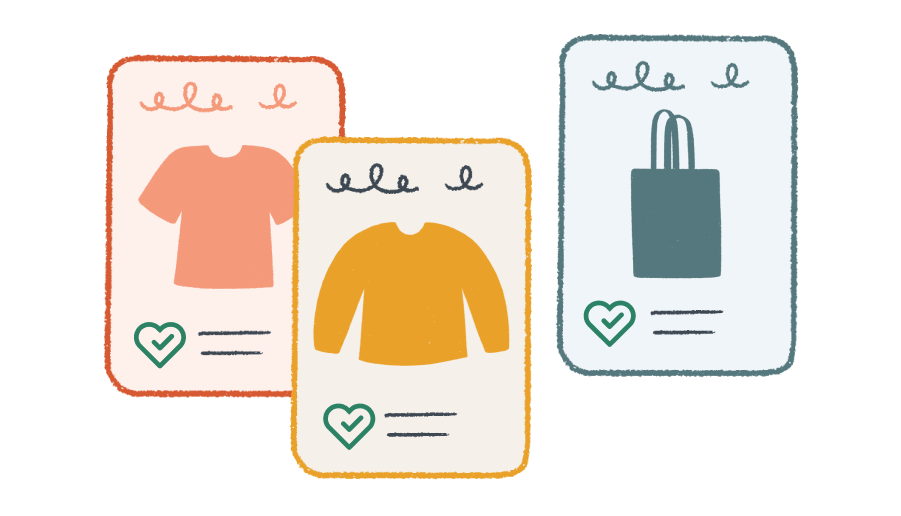Disclaimer: The information provided on this page is for educational purposes only and should not be considered professional or personalized financial advice. Every individual’s financial situation is unique, and it is important to consult with a qualified financial advisor or tax professional before making any financial decisions.
Yes! Nonprofits can sell products and services, such as t-shirts or training courses, to generate revenue to support their mission and fund activities.
As long as organizations adhere to regulations specific to nonprofits that sell products, the advantages of product sales can be very impactful. The key is to make sure that all of the products being sold are closely aligned with the nonprofit’s mission and resonate with its target audience.
For example, an environmental nonprofit might sell customized reusable water bottles to promote sustainability. Or a nonprofit focused on education might sell books, educational materials, or tutoring sessions to empower knowledge seekers.
Let’s explore relevant tax information, regulations surrounding nonprofit product sales, and the benefits of this fundraising method to help you sell products successfully.
Regulations for Nonprofits Selling Products


One of the most prevalent nonprofit myths is that nonprofit organizations cannot legally turn a profit—this is false.
Nonprofits can generate income—however, it must be saved in a restricted reserve or invested back into the nonprofit in another way. When organizations have money left over, they can better plan for the future, pad out a healthy emergency fund, and ultimately do more for their community. For example, surplus funding could allow the organization to react quickly to a natural disaster, bringing their community immediate relief.
Selling products could help your nonprofit go beyond breaking even and gain surplus funding. But to maintain tax-exempt status, you’ll need to carefully follow these regulations:
Tax Guidelines
As mentioned above, your nonprofit is free to sell as many products as it likes if those products are connected to accomplishing your mission or goals. If the products are not related to your mission, you’ll need to:
- Track Unrelated Business Income Tax (UBIT): This tax can apply to nonprofits that sell products that aren’t directly related to their mission. The UBIT could reduce the overall profit the nonprofit makes from selling products, so it’s a good idea for nonprofits to consider whether their product sales align with their mission before launching sales. Seek guidance from a nonprofit tax professional if needed.
- File a Form 990-T: Unless it’s your nonprofit’s first year of operations, you’re likely familiar with the IRS Form 990, which is the tax return document all exempt organizations must complete each year. If your nonprofit raises over $1,000 in gross income by selling products unrelated to your mission, you must also file a Form 990-T.
You may also need to collect and pay a sales tax on these product sales. While nonprofits are usually exempt from paying sales tax, this can vary by state and local area. Carefully review local regulations and reach out to a tax professional if you have questions.
Requirements for Ongoing Tax Exemption
While nonprofits are allowed to engage in some commercial activity, it’s good to be mindful of how much is too much. Nonprofits that stray too far from their mission and generate too much revenue from unrelated activities may risk losing their tax-exempt status.
Partaking in prohibited transactions can result in your nonprofit losing its hard-earned 501(c)(3) status—a consequence that could set your nonprofit back significantly. Cornell Law School’s resource on prohibited transactions provides a full list of these transactions.
We know it can be tempting to pursue every opportunity to raise funds, but it’s crucial to stay true to your mission and focus on activities that align with your values. By doing so, your nonprofit can continue its work and stay in good standing with the government.
Liability Concerns
Nonprofits that sell products must be aware of product liability laws. These laws protect consumers and hold organizations accountable if their products are found to be defective or harmful. Just as measures like having volunteers sign waivers can protect your organization, following these regulations can prevent costly litigation.
The majority of U.S. product liability laws are determined at the state level, so get familiar with the specific regulations in your area. You’ll need to ensure that your products are safe and high quality, not just for legal reasons but also to maintain the trust and satisfaction of your supporters. By being mindful of product liability, nonprofits can continue providing great products and services while also keeping their supporters happy and safe.
Benefits of Selling Custom Merchandise for Nonprofits


Now that you’re familiar with the list of restrictions for nonprofits selling products, let’s dive into the list of benefits your nonprofit could experience by selling custom merch!
Generate Additional Revenue
By selling custom merchandise, nonprofits can open up new revenue streams that provide consistent, reliable funding for their programs and services. Selling merch also diversifies your fundraising portfolio and makes you less reliant on one-time big donations or grants.
Maximize Your Fundraising Revenue With Bonfire
Sell merch on Bonfire and receive 100% of the profits from each sale. Set your own prices to ensure you get the best return possible on every item you sell. Turn on additional donations for the campaign so supporters can boost their contributions at checkout!
Increase Brand Awareness and Visibility
Merch is a powerful branding tool that can help you spread awareness about your organization and its mission. This is a great way to attract new supporters who may not have heard of your organization.
Just remember to infuse various elements of your nonprofit’s branding into the merch, like your logo, brand colors, and fonts. Then, when supporters wear or use your merch, they become walking billboards for your cause!
Encourage Community Engagement
Selling custom merch will engage your community and foster a sense of belonging among your supporters, especially when you promote the campaigns via email and social media platforms. When supporters feel personally involved in your organization’s brand and mission, they’re more likely to get involved, refer friends and family, and advocate for your cause!
Provide a Tangible Way to Support a Cause
There are many people out there who want to support nonprofit causes, but they may not have the time or resources to volunteer or donate significant funding. By selling merch, nonprofits can offer supporters a fulfilling and tangible way to support their cause and (bonus!) show their support visibly!
Create Opportunities for Partnerships
Selling merch can also create opportunities for partnerships with other businesses or organizations. For example, you might secure a corporate sponsorship or grant from a local business and feature their logo on the shirt in return.
By partnering with like-minded companies or brands, nonprofits amplify their message and reach new audiences. Partnerships also provide opportunities for cross-promotion and co-branded merchandise, which helps both parties increase visibility and revenue. Win-win!
Where Nonprofits Can Sell Merch
There are many opportunities for your nonprofit to sell merchandise. Depending on your funding needs, consider selling products at:
- Fundraising events. A booth selling your merchandise is a natural addition to your fundraising events. For example, sell branded, commemorative t-shirts at your walk-a-thon to participants and spectators.
- Online stores. Online stores make it easy to share, sell, and ship out your products to supporters near and far. Choose a custom merchandise vendor that also provides a custom merch shop for your nonprofit to streamline the process.
- Social media. Promote your products online and allow supporters to purchase directly from social media platforms to boost convenience (and sales!). For example, sell merch on YouTube when you choose a vendor with a YouTube Merch Shelf integration.
You can also infuse product sales into your peer-to-peer fundraising campaigns. Share the product online and encourage your supporters to sell the item to their friends and family members. Not only will they get an item that spreads awareness of your organization, but the proceeds will benefit your cause!
Choosing the Best Custom Merch Platform for Your Nonprofit


Now that you’re ready to make merch for your nonprofit, let’s discuss the top things you should consider when choosing which custom merch platform you’ll use.
What Products You’ll Sell
Define which items you’ll sell, and choose a custom merchandise platform with the facilities and resources needed to create them. Some of the most popular products for nonprofits include:
If you already have a large base of supporters, you might want to launch a collection of items rather than just one. We recommend selecting a platform that lets you create an online store so you can easily show off all your products in one place.
Cost
One of the most important factors to consider when choosing an online custom merch platform is cost. Nonprofits should consider not only the price of the platform itself but also any additional fees, such as processing or shipping costs. It’s also important to consider the profit margins offered by the platform—will you be able to make a significant profit from your merchandise sales?
Looking for Low Costs? Fundraise on Bonfire!
Bonfire’s platform is 100% free and requires no upfront costs, making it an excellent choice for nonprofits looking for an affordable online merch platform.
Easy to Use
Nonprofits should choose a platform that is easy to navigate, both for the organization and for the supporters who will be purchasing merchandise. This can include the ability to create custom designs, the flexibility of the platform, and the availability of customer support.
Integration Options
Consider the integration options available with a custom merch platform. Ideally, the platform should be able to integrate seamlessly with your organization’s existing website or social media channels, as well as any fundraising or CRM software (a platform that connects your different departments into one cohesive system) that you may be using.
Bonfire‘s Seamless Integrations
Bonfire offers a variety of integrations with industry-leading eCommerce and fundraising tools like Linktree, Classy, and more!
Nonprofit-Friendly Features
One of the most important aspects to consider when choosing a platform is nonprofit-friendly features. These features can significantly improve your fundraising efforts and create a seamless experience for you and your supporters.
Some nonprofit-friendly features include:
- Customizable pricing
- Generous profit sharing, in which a substantial percentage of the profits from merch sales goes directly to your nonprofit
- Additional donation options
- Supporter contact management
- Reporting and analytics
Bonfire Offers Special Perks for Nonprofits
Bonfire offers a full suite of features that were designed specifically to help nonprofits raise more money and connect with their community through custom apparel. Learn more >
It’s true—nonprofits do face certain restrictions when selling products like custom merch. But once you get past this initial bump in the road, the benefits will vastly outweigh any setbacks.
Selling products provides additional revenue, fosters community engagement, raises awareness, and amplifies your cause. To make the most of these benefits and create lasting change, select a platform like Bonfire that’s risk-free, cost-effective, and tailored to nonprofit needs.
For more fundraising tips for selling products and beyond, explore these additional resources from our blog:
Boost funding by selling custom nonprofit merchandise.
Launch a Bonfire apparel fundraiser for your nonprofit today!
Written by: Hayden Ireland / Content Specialist
Illustrated by: Madison Summers / Lead Marketing Designer



